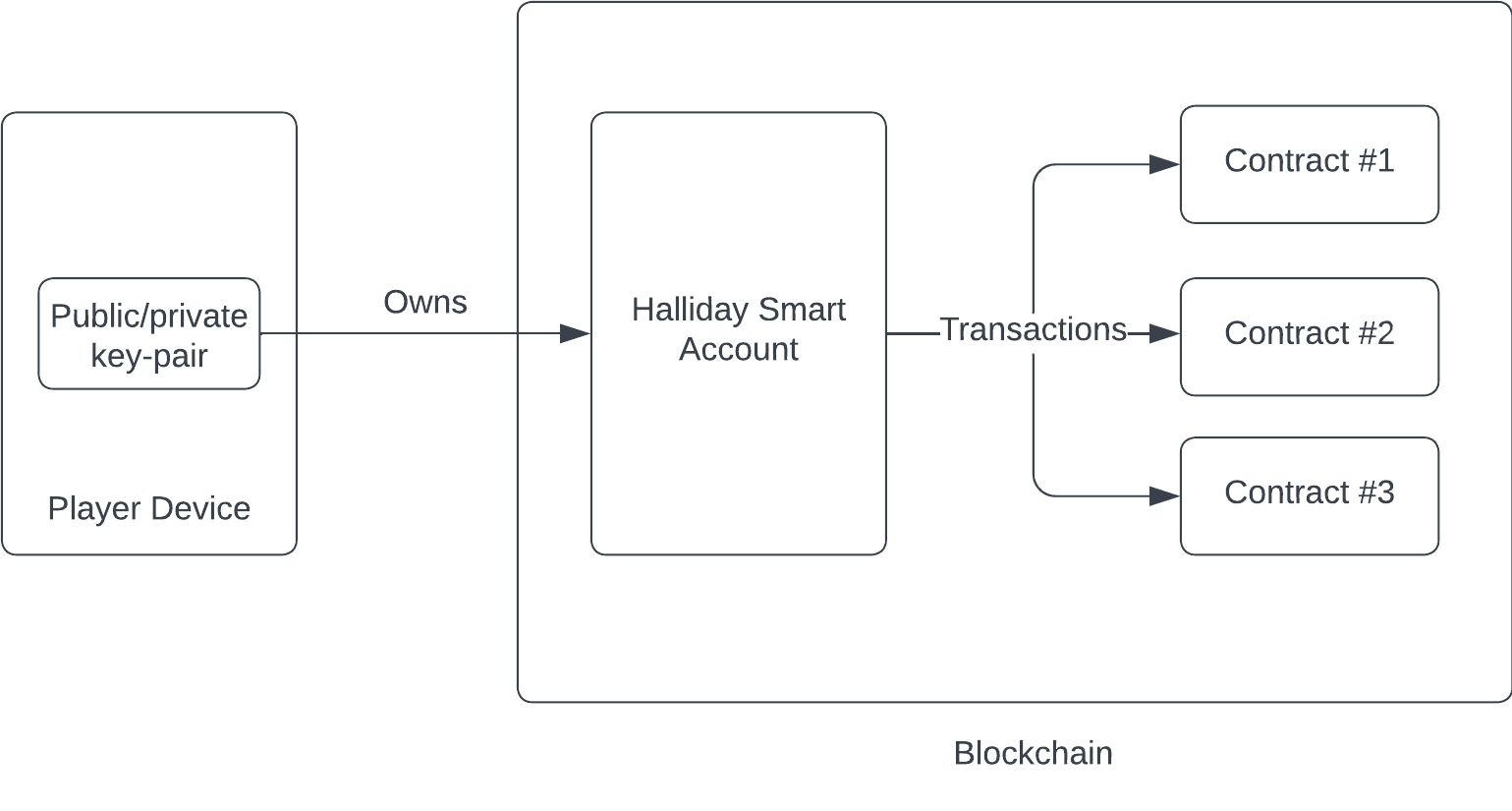Architecture + Concepts
Why a Unified Appchain Wallet?

Our product is designed for developers building on an Appchain. In addition to providing a seamless user onboarding experience via the myriad benefits of Account Abstraction, we also facilitate monetization, asset management, and atomic composability for decentralized applications and their users.
We address these key challenges with our Intent Orchestration Protocol, which leverages and unifies decentralized exchanges and messaging protocols and is built directly into our ERC-4337-compliant Smart Accounts.
That means users can acquire and manage any token, on any chain, with just one click.
The Halliday Intent Orchestration Protocol
The Halliday Intent Orchestration is built directly into our Unified Appchain Wallet, and leverages and unifies decentralized exchanges and messaging protocols. In practice, that means users can acquire and manage any token, on any chain, with just one click - all from their own wallet.
We make hundreds of EVM Chains feel and operate as though they are one.
Get users to the first dollar spent
The biggest problem Appchains face today is how to get users to spend a single dollar. Native onramps are extremely rare, and cross-chain protocols are too complex for users to easily navigate. If you’re not crypto-native, it could take hours to get funds onto a new chain.
With the Halliday Onramp, we make a native onramp possible for the first time. Users express their intent of how much of your token they want to purchase, and we orchestrate the flow of funds on their behalf, abstracting bridging and swapping away in a fully non-custodial manner. Your users always own their funds.

Asset Management
The future of the EVM is a million Appchains. How do you manage so many different containers of assets? We handle the retries, gas payments, asset balances, transaction formation, batch scheduling, and network routing all with a single click. This makes million-chain asset management - an impossible task today - a breeze.
Atomic composability
The Halliday Intent Orchestration Protocol allows users to aggregate balances across chains for purchases, swaps, stakes and more, all with a single click. Users with $1 in USDC on 10 different Appchains, for example, can make a $10 purchase on an eleventh chain without having to acquire 11 different gas tokens or complete 10 different bridges.
Available Today
This is not slideware: it has been in production for months with DeFi Kingdoms (see it live here!). We have seen an increase of new users coming into the DFK ecosystem because we’ve making the first dollar spent easier than ever. We’ve made it so easy to buy $JEWEL that many of the game’s oldest players — who already know the ins and outs of crypto — have been using the Onramp as their preferred method of buying the token as well.
The fundamental problem of a million Appchain EVM is UX. The solution is a unified Appchain Wallet.
Account Abstraction
The Halliday Unified Appchain Wallet is built on top of the Account Abstraction standard (ERC-4337), meaning every Halliday Appchain Wallet is a fully-functional Smart Account. ERC-4337 is a novel innovation that standardized a set of smart contracts that enable users on EVM chains to use contracts as accounts as opposed to an EOA.
Now, what does this mean?
Let's first start with some terminology. On Ethereum (and all EVM compatible blockchains) there are two types of accounts: Externally Owned Accounts and Smart Contract Accounts.
Externally Owned Accounts (EOAs): These accounts are the traditional form of user accounts on Ethereum, controlled solely by a public/private key pair. Lacking any associated contract code, EOAs are straightforward in function, allowing for basic operations like sending and receiving Ether or interacting with smart contracts. These are the 'default wallets' that many people refer to when saying they have an Ethereum wallet.
Smart Contract Account: A smart contract account is an Ethereum account controlled by its deployed code rather than a private key. These accounts serve as the backbone for any smart contract protocol. The contract code dictates how the account's state is updated on-chain, following the logic defined in the deployed contract.
So, what is Account Abstraction?
Account Abstraction is a protocol standard that enables users to have smart contracts as their wallets. This added layer of programmability allows these smart contract-based wallets to execute more powerful logic, such as gas-sponsored transactions, batch contract calls, conditional logic based on transaction properties, offering a more flexible and customizable user experience. Due to this programmability, the world is our oyster when it comes to traditional wallet features. Account Abstraction accounts can perform arbitrary logic, facilitating a dramatic improvement in UX and functionality. No more seed phrases!
The Halliday Unified Appchain Wallet is built on-top of ERC-4337 and is purpose-built to cater to the unique needs of blockchain applications. It offers myriad UX improvements and direct integrations with economic tooling, such as session keys to enable seamless auto-signing (no more disrupting popups), social-login (no seed phrases), device log-in (use your iPhone to create a smart account), and much more.

Updated 28 days ago